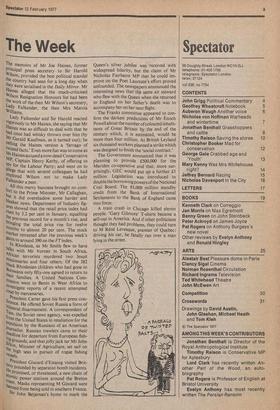The Week
The memoirs of Mr Joe Haines, former Principal press secretary to Sir Harold Wilson, provided the best political scandal the country had seen for a long day when they were serialised in the Daily Mirror. Mr Haines alleged that the much-criticised Wilson Resignation Honours list had been the work of the then Mr Wilson's secretary, Lady Falkender, the then Mrs Marcia
Lady Falkender and Sir Harold reacted
vigorously to Mr Haines, she saying that Mr Haines was so difficult to deal with that he
had once had whisky thrown over him (by IT Gerald Kaufman, as it turned out); he Calling the Haines version a farrago of twisted facts.' Even more fun was to come as
Mr Haines accused a now-dead Conservative MP, Captain Henry Kerby, of offering to Spy for the Labour Party; and went on to a.11ege that with several colleagues he had implored Wilson not to make Lady Palkender a peer.
All this merry business brought no comfort to the Prime Minister, Mr Callaghan, but it did overshadow some harder and bleaker news. Department of Industry figures showed that the retail price index had
risen by 3.2 per cent in January, equalling ttl,le previous record for a month's rise, and uringing the total price rise for twelve Months to almost 20 per cent. The stock Market retreated after the previous week's gains to around 390 on the FTindex.
In Rhodesia, as Mr Smith flew to have talks with Mr Vorster in South Africa,
A_C.rican terrorists murdered two Jesuit 'Luissionaries and four others. Of the 382 Rack Rhodesian children who had gone to
°tswana only fifty-one agreed to return to their families. A United Nations Corn
ission went to Benin in West Africa to ulvestigate reports of a recent attempted ceulp by mercenaries. r President Carter gave his first press con,e.reoce. He offered Soviet Russia a form of .!lateral disarmament. A correspondent of (.45, the Soviet news agency, was expelled irotri the United States in retaliation for the e.XPUIsion by the Russians of an American 1,M-irnalist. Russian trawlers came to their iueadline for departure from European fishsng grounds, and that jolly jack tar Mr John thilkin, Minister of Agriculture, set sail on , e high seas in pursuit of rogue fishing "essels.
t President Giscard d'Estaing visited BritPreceded by separatist bomb incidents. age promised, or threatened, a new chain of et°Mic power stations around the Breton boast. Masks representing M Giscard were anned from being sold in southern France. Sir John Betjeman's hymn to mark the
Queen's silver jubilee was received with widespread hilarity, but the claim of Mr Nicholas Fairbairn MP that he could improve on the Poet Laureate's effort proved unfounded. The newspapers announced the interesting news that the same air steward who flew with the Queen when she returned to England on her father's death was to accompany her on her next flight.
The Franks committee appeared to confirm the darkest predictions of Mr Enoch Powell about the number of coloured inhabitants of Great Britain by the end of the century which, it is estimated, would be more than four million. At British Leyland six thousand workers planned a strike which was designed to finish the social contract.'
The Government announced that it was planning to provide 000,000 for the Meriden co-operative and that, more surprisingly, GEC would put up a further £1 million. Legislation was introduced to double the borrowing powers of the National Coal Board. The 83,000 million standby credit from the Bank of International Settlements to the Bank of England came into force.
A train crash in Chicago killed eleven people. 'Gary Gilmore' T-shirts became a sell-out in America. And if other politicians thought they had problems, they could turn to M Rene Levesque, premier of Quebec: driving his car, he fatally ran over a man lying in the street.


































 Previous page
Previous page